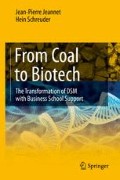Abstract
In this chapter, the authors describe the key lessons that both business schools and business can learn from such a long-standing collaboration. Taking the view of wanting to engage in such collaborations, the chapter begins with the impact of this collaboration on DSM as an organization. The concept of the successive waves of DSM initiatives is introduced and the changing roles DSM required from business schools as the waves were rolled out. Turning tables, the authors describe based upon their experience the requirements that must be met on the corporate side to be able to benefit from such longstanding collaborations. Finally, the authors offer their own views why the collaboration between DSM and selective business schools could last for 25 years.
Access this chapter
Tax calculation will be finalised at checkout
Purchases are for personal use only
Notes
- 1.
See the biographies in About the Authors.
- 2.
Source: DSM Annual Report 1988 and DSM Annual Report 2005: 9.
- 3.
Source: Pank van de Kooij, DSM Business Academy and Program Manager, exchange dated 26 March 2014.
- 4.
Erasmus School of Management in Rotterdam also had long-term programs with DSM.
- 5.
Interview with Menno de Vries, Manager Corporate Development and Training (retired 1995), DSM, and responsible for the administration of the IMPACT seminar series, held by Hein Schreuder and Jean-Pierre Jeannet, in Genk on 30 January 2013.
- 6.
DSM’s Business Academy (DBA) came into existence on 1 July 2003 through the combination of the Corporate Training Department in Heerlen with the Dutch Training Department (MO&T) and was initially headed by Harm Bakker, who succeeded Christiane Thielens. Up to that point, the faculty teams from IMD and Babson primarily had contact with the Corporate Training Department whose first head was Menno de Vries. Source: email exchange with Pank van de Kooij, dated 19 February 2014.
- 7.
At the time, IMEDE/IMD charged CHF 125,000 per week, or CHF 250,000 for each program.
- 8.
Agreement made between DSM (Menno de Vries) and IMD (President Juan Rada) in Rotterdam on 10 April 1991.
- 9.
John Murray (Trinity Dublin) and Joe D’Cruz (Toronto University) were teaching as visitors at IMD during the IMPACT program and thus, were not covered by the IMD policy. Later on, James Henderson (Babson) and Dan Muzyka (INSEAD, previously from Babson) were not part of the IMD policy. When Henderson later joined IMD on a full-time basis, he was no longer able to participate; but, when SMC was terminated and continued under MLP-3 Jeannet was allowed to teach all of the strategy sessions.
- 10.
IMD was charging about CHF 30,000 per delivery day at its Campus in Lausanne-Ouchy. Faculty consulting rates at that time averaged about CHF 5,000 per day, or CHF 10,000 for two faculty members which was the common staffing model for executive programs. Additional costs had to be considered as well. IMD offered an all-inclusive price for a day-package, including venue, classroom, group meeting rooms, lunch and coffee breaks (but did not include hotel charges). For in-house programs, DSM had to cover all of the inclusive items that were part of the IMD package and the extras, such as hotel charges. Hotel stays in Holland, however, were cheaper than in Switzerland and with mostly Dutch participants, travel costs were minimized. Only faculty travel costs had to be covered.
- 11.
When DSM assigned the program to the University of St. Gallen (Switzerland), Jeannet was the only faculty member held over from previous programs to participate.
- 12.
From 1994 to 2009, Professor Dominique Turpin from IMD participated in the Marketing programs under the Babson umbrella. At first, transfers were made from Babson to IMD for the relevant time. Later on, IMD agreed that Turpin could do this on a private consulting basis. When Turpin himself assumed the presidency of IMD, his involvement was discontinued.
- 13.
IMD internal statistics on DSM participants, IMD sources, for the period of 1989–2013.
- 14.
Innovation programs delivered by IMD faculty for DSM were led by Professor Bill Fisher.
- 15.
Babson College had its own Center for Executive Education located on the Babson College Campus in Wellesley, Mass., some ten miles outside Boston. It was an integrated facility combining classrooms, meeting rooms, dining facilities and bedrooms under one roof.
- 16.
At Babson, the Babson School of Executive Education (BSEE) was a separate unit under its own Dean. The focus of the school was on custom programs for companies, rather than open-enrollment programs. BSEE was located within the Babson Center for Executive Education (BCEE). BSEE rented space as needed from BCEE but other clients could also rent space there and run their own programs. About one-third of the capacity used at BCEE was originated from Babson’s BSEE. As was the case for DSM, Babson also runs many programs off-campus or overseas.
- 17.
“Feike Sijbesma: Dilemma’s verzoenen is niet altijd eerlijk,” MT Management Team, 9 September 2011, see: http://www.mt.nl/157/44895/magazine/feike-sijbesma-dilemma-s-verzoenen-is-niet-altijd-eerlijk.html. While the last part of the quote refers to the CSD process, this approach to change has been adopted quite generally at DSM. See also: Joseph Jaworski. Synchronicity. San Francisco: Berrett Koehler, 1996.
- 18.
In both meetings a staff member of Corporate Strategy & Acquisitions, as well as one from Corporate Finance & Economics, would usually be present.
- 19.
Elaine Eisenmann, telephone interview with Jean-Pierre Jeannet at Babson, 29 October 2012.
Author information
Authors and Affiliations
Rights and permissions
Copyright information
© 2015 Springer-Verlag Berlin Heidelberg
About this chapter
Cite this chapter
Jeannet, JP., Schreuder, H. (2015). Lessons for Academia and Business. In: From Coal to Biotech. Springer, Berlin, Heidelberg. https://doi.org/10.1007/978-3-662-46299-7_14
Download citation
DOI: https://doi.org/10.1007/978-3-662-46299-7_14
Publisher Name: Springer, Berlin, Heidelberg
Print ISBN: 978-3-662-46298-0
Online ISBN: 978-3-662-46299-7
eBook Packages: Business and EconomicsBusiness and Management (R0)

